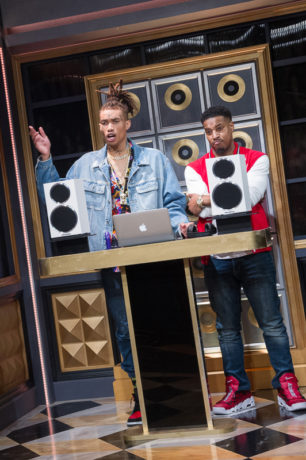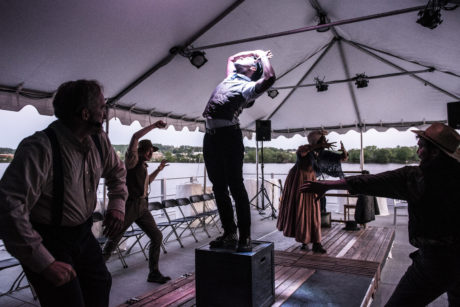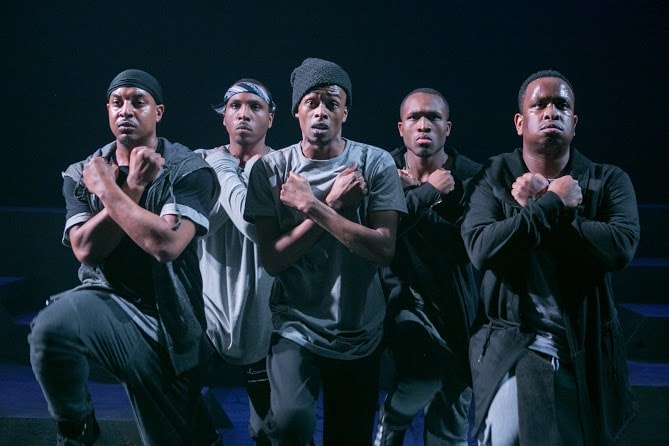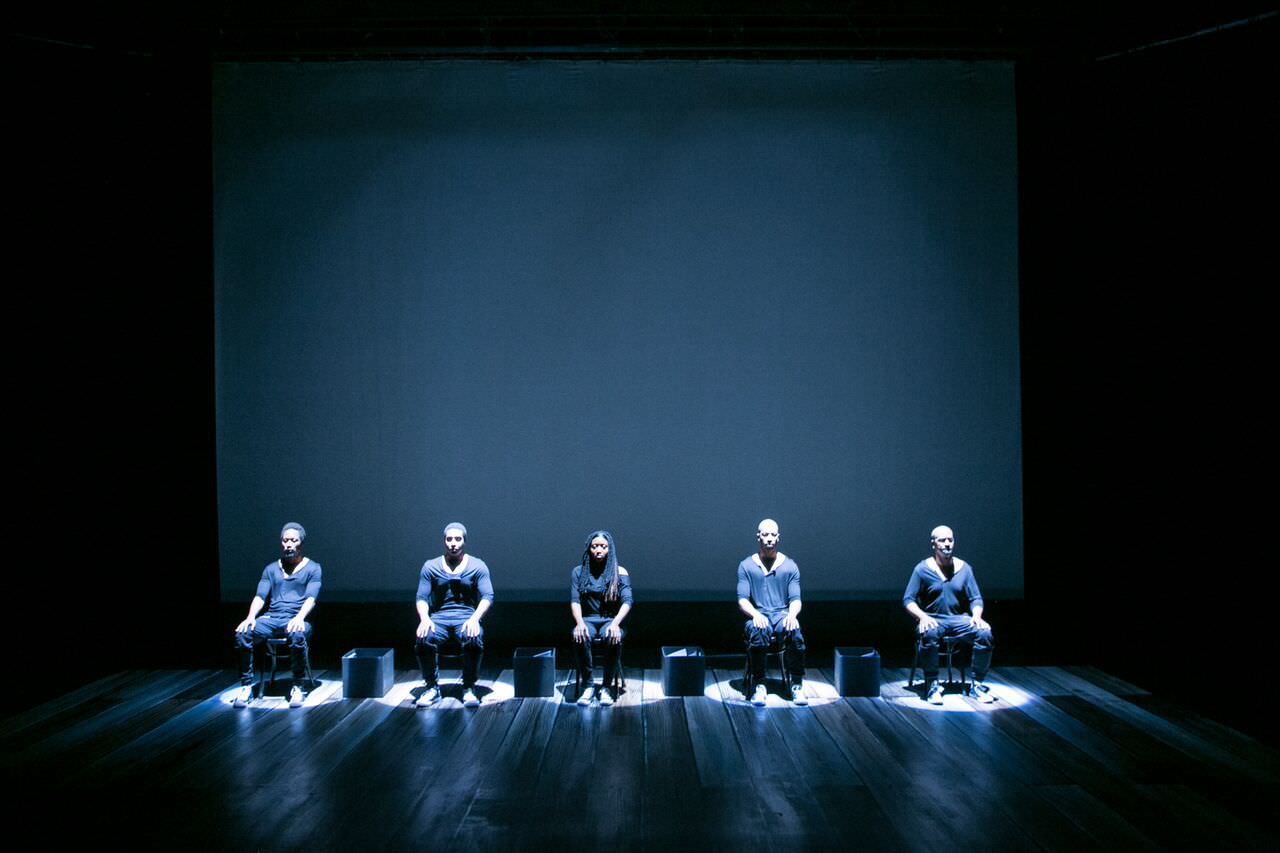I have an ongoing interest in how theaters in DC with predominantly white audiences raise and represent the issue of race. And one of the things I’ve been noticing is how the white comfort zone functions in programming and in performance.
If you Google “white comfort zone” you’ll get results about home decor. But to anyone halfway woke, the phrase has another, self-evident meaning: It’s the mindset of a subset of white theatergoers who are disinclined to have to think too hard about the realities of racism. So theaters around town program around the white comfort zone differently, with works of theater that relate to it differently—some try not to upset it, some will unsettle it just a little, and some intend to seriously disrupt it.
[Read Barbara Mackay’s review.]
This all came to mind as I watched the very provocative and hilariously discomfiting new play now running at Studio Theatre, Tearrance Arvelle Chisholm’s P.Y.G. or the Mis-Edumacation of Dorian Belle.
I recognized Gary L. Perkins III, one of the three actors in the show, from his work in three previous productions I’d written about for DC Theater Arts: The Frederick Douglass Project, Word Becomes Flesh, and The Shipment—all of which, like P.Y.G., navigate the white comfort zone in significant ways. So I asked if we could chat about that.
John: Let’s start with your performance in P.Y.G. as Alexand Da Great (which is amazing, by the way—the dancing, the rapping, the singing, the acting, I loved it). I was there opening night and there seemed to be a lot of awkwardness in the audience, which seemed intentional on the part of the play. There were points that were fraught with tension about race but in a jokey way, sometimes in a serious way, sometimes in a jokey way that you didn’t know was jokey. It was as if the play wants us to have a good time but it also wants to shake up a lot of presumptions typical of white people.
Gary: Absolutely. My experience is very similar. There’s different focus in conveying a message in a direct way or in a farcical way—like the commercial breaks that happen throughout the play. My character Alexand is a very direct character. He’s very outspoken and headstrong about his opinions. So to reel that in during the commercial breaks, where the underlying messages were conveyed through humor, was a bit of a struggle.

You do a commercial for a product called DeWoke, an aerosol spray that will erase political consciousness.
Yeah, it takes your mind off what reality is and keeps you oversaturated with consuming.
There’s also a commercial for WhiteMen’s shoes.
Yeah, that’s delivered by Blacky [Seth Hill]. I play the character who is buying the WhiteMen’s shoes, and it’s about what privilege offers and how you can use that privilege in your everyday life.

I’m interested in your conversations during rehearsals with your castmates and the playwright-director about the race themes in the play, how those themes will play for audiences, what’s the intention.
Tearrance [Playwright Tearrance Arvelle Chisholm] finished a play last year at Mosaic Theater Company called Hooded, Or Being Black for Dummies. Afterward, a lot of white people asked him, “Well, what can we do?” So in response, he started writing this play, as a means to give them an idea of what they can do.
In the rehearsal process, we wanted to be authentic in that response. That’s where we started from, and it was very collaborative, making sure the message was always there no matter the means of getting it across—whether through the reality-tv scenes and the tensions between the characters or the farcical commercials.
In performance, how have audiences been responding? Is that awkwardness still around?
I think it is initially. At the beginning, it’s reality tv. The characters have confession scenes presenting who they are and what’s going to be happening in the play. And audiences are comfortable with the spectacle of that part. But then as we get to the WhiteMen’s shoes commercial, it’s just pure shock. The message is so direct and so blunt that most audiences aren’t expecting it. You can feel it takes a while for them to open up and warm up to the type of humor that’s being presented in this play.
It’s a very nervy and edgy kind of humor.
Absolutely.

I was impressed that the three actors seemed to have a kind of cohesion about what’s going on, even though there’s a lot of tension between the characters given that two are black and one is white.
This play is predominantly about cultural appropriation, and we understood that cultural appropriation is a two-way street. It doesn’t just work with one culture stealing from another culture to their own advantage. So we wanted to make that two-way street clear in the struggle between each character and in their own self. This is very much a self-identity play as well because it’s a journey that each character goes through to discover who they are.
It isn’t just the Justin Bieber figure who goes on a journey; it’s also Blacky and Alexand. And there’s a dynamic between Blacky and Alexand in the play that’s also interesting. Blacky starts out much more radical—
Right.
—and then he becomes more assimilationist, and your character Alexand tries to hold him to account for that.
Absolutely, and Alexand holds Blacky accountable in the sense that they’re there to teach the pop star. Alexand’s journey starts with trying to keep Blacky—his friend, his brother, his cousin—focused on what the objective is. Remaining true to that objective, Alexand realizes that he’s being consumed by this environment that’s unfamiliar to him.

You rap in P.Y.G. and you rapped in Solas Nua’s The Frederick Douglass Project, where you played Frederick Douglass. But that was a very different kind of play with a very different relationship to the audience.

The environment was powerful in itself. The play was presented in a tent across the river from where Frederick Douglass’ house was. And the space was very intimate. Many people are familiar with him but the play modernized him.
Your performance was magnificent, and having the real historical character being portrayed brought a kind of gravity to it and a seriousness and importance that was really stirring.
Oftentimes we see Frederick Douglass in his later life, after he’s had all his accomplishments, so it was a breath of fresh air to portray him at a younger age.
In Theater Alliance’s Word Becomes Flesh, you played part of a group of five men who are giving poetic voice to one man’s life experiences. It’s a very choreographed piece and won the 2018 Helen Hayes Award for Outstanding Ensemble.

That was a genuine ensemble piece because it’s five different men portraying five versions of one black man—and for 60 minutes of movement, we had a bond onstage through choreopoems. The message itself was not only timely, it’s timeless—the urgency of understanding the struggles black men go through on a day-to-day basis. We were realizing that for ourselves and for people who may not understand what we have to deal with.
I thought that from a white audience’s point of view, the cohesion among you all was as much the message of the play as the playwright’s text. It was an experience of a bond that was about the fact that you were all black. And that had nothing to do with deference to a white audience; it was you being you.
Even with that cohesion, we talked a lot in the rehearsal process about the lifeline, and the lifeline being the breath, and how breath was so important through this piece because we’re all supposed to be the same character, and so to be one and the same with one breath was very important.

You appeared in The Shipment at Forum, and its treatment of race themes was also jokey. It was modeled on a variety show and it included comedy sketches. One of them is set in a video shoot that’s supposed to feature a rapper, played by you.
The show is in three parts. It opens with standup. Then it goes into a minstrel show. And it ends with a dinner party. What sparked my interest even before I auditioned was that the play is about black self-identity and it’s by an Asian American woman.
Of the four plays we’re talking about here, The Shipment was in many ways the most in-your-face about race.
Yes. And I think it goes back to the structure of the minstrel show. It was very raw. The jokes in the opening standup were very raw. It may have been a little overbearing in the humor—
Oh, it was powerful. It took you aback. But I thought it was great.
We often forget in the American theater that that’s what the platform of theater is, to have the voice of the voiceless and messages that no one else will say.

These four plays up to the present with P.Y.G. are all about black identity. Reflecting back on them, what about you has changed with each? What did each role draw on that was different and distinct? As an actor, how did you move into each of those different spaces?
For me as a performer over the years, it’s really shaped the narrative I want to express when I’m auditioning and accepting roles in certain stories to be a part of. One of the reasons I’m an actor is that acting is therapy—to step into other lives and minds of fictional and nonfiction characters. So there’s been growth along the years. It’s grounded me as a man. And it’s a beautiful opportunity to have a part in these stories when in American theater it’s predominantly stories of white men.
Running Time: One hour and 50 minutes, without intermission.
PYG or The Mis-Edumacation of Dorian Belle plays through April 28, 2019, at Studio Theatre, 1501 14th St NW, Washington, DC. For tickets, call the box office at (202) 332-3300, or go online.




